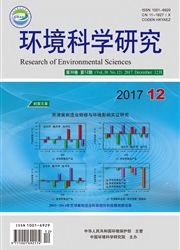

 中文摘要:
中文摘要:
采用室内恒温通气培养法,以北京地区耕作层典型粉壤土为对象,研究盐分对土壤氮素矿化和硝化的影响.实验设置了4个不同盐分〔以ρ(NaCl)计,分别为20,30,50和80 mg/L〕处理和对照处理,并在硝化实验的土壤中加入一定量的(NH4)2SO4,分别在30℃恒温培养箱中进行为期105 d(矿化)和49 d(硝化)的培养实验.结果表明:在初期的培养中,低盐分有利于土壤氮素转化,ρ(NaCl)为20 mg/L的处理分别比对照处理的累积矿化量和累积硝化量多18.21%和1.87%;而在长期培养过程中,高盐分不利于土壤氮素转化,且ρ(NaCl)越高抑制越明显,其对土壤氮素矿化和硝化的抑制率达到67.92%和62.58%;土壤矿化势和硝化势随w(NaCl)分别呈指数递减,矿化速率常数和硝化速率常数与土壤中w(NaCl)为二次函数关系.
 英文摘要:
英文摘要:
With laboratory incubation method at constant temperature under aeration conditions, an experiment was carried out to investigate the effect of sodium chloride (NaCl) on mineralization and nitrification in a silt loam soil which is one of the typical soils in the cultivated layer of Beijing area. Concentrations of NaC1 solution applied to the soil were O, 20, 30, 50 and 80 mg/L, respectively. The soil was amended by using ( NH4 )2SO4 solutions (nitrification), and then aerated with temperature of 30 ~C for 105 days (mineralization) and 49 days (nitrification). Results indicated that mineralization in the soil was enhanced by low concentration at the initial stages. The cumulative mineralization and nitrification for treatment with concentration of 20 mg/L increased by 18.21% and 1.87 % respectively, compared with the contrast treatment. For a relatively long period, mineralization and nitrification of nitrogen were inhibited by NaC1 concentration. The mineralization and nitrification rate decreased with concentration increasing. The inhibition rate of cumulative mineralization and nitrification reached 67.92% and 62.58% respectively. Mineralization mad nitrification potential decreased exponentially with salt concentration, respectively. Relationship between mineralization constant and nitrification constant and salt concentration can both be expressed as quadratic function.
 同期刊论文项目
同期刊论文项目
 同项目期刊论文
同项目期刊论文
 期刊信息
期刊信息
